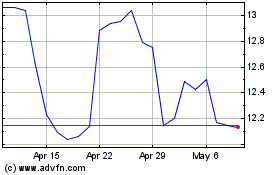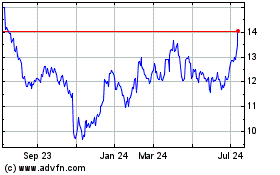Ford Scoops Up Software Firms as It Drives Toward the Driverless
January 25 2018 - 4:26PM
Dow Jones News
By Mike Colias
Ford Motor Co. is acquiring two small software firms to help
build out its mobility business, a move that highlights the need
for auto companies to seed their management teams with technology
talent to keep pace in a fast-changing transportation sector.
Ford said Thursday it is buying Autonomic Inc., a Palo Alto,
Calif., startup with 70 employees that is developing a software
backbone for Ford to provide urban transit services to consumers
and businesses. Ford said the firm's CEO, Sunny Madra, will lead a
new team inside Ford that will come up with ideas for new transit
options.
The nation's No. 2 auto maker by sales also said it would
acquire TransLoc, a North Carolina firm that makes software to help
transportation operators optimize drive routes. Ford didn't
disclose terms of either transaction.
Adding talent through acquisitions has become a common strategy
among conventional auto makers and suppliers as they scramble to
compete with tech giants to develop driverless vehicles and build
businesses around them.
Ford, for example, is spending $1 billion over five years for
artificial-intelligence startup Argo AI, whose founders had
previous ties to Alphabet Inc. and Uber Technologies Inc. GM in
early 2016 bought autonomous-vehicle developer Cruise Automation in
a deal potentially valued at $1 billion, based on performance
milestones.
Cruise, based in San Francisco, has become GM's Silicon Valley
beachhead for attracting tech talent. GM has grown Cruise's
workforce 10-fold in two years, to about 500 employees.
In acquiring Autonomic and TransLoc, Ford considered areas
"where we thought we needed a really fast infusion of help," Ford
Mobility President Marcy Klevorn said.
Traditional auto makers are leaning on acquisitions across a
broad range of tech realms -- everything from software and hardware
for self-driving cars to consumer apps -- as they prepare for a
future in which cars are increasingly automated and connected to
other parts of the transportation system.
BMW said this week it acquired Parkmobile, an app that allows
users to pre-book and pay for parking spots. GM and Ford's Argo
each recently acquired companies developing lidar, or laser-based
systems that give autonomous cars a 3-D view of their
surroundings.
Ford's approach to building a driverless-vehicle business
differs from that of GM, which is focused on deploying its
autonomous Chevrolet Bolt in a robot-taxi service in 2019. Ford is
focused on offering services to commercial customers who need to
move goods or people around cities.
Ford said it is starting a service that works with health-care
providers to shuttle non-emergency patients who don't or can't
drive themselves. Its Chariot van service contracts with employers
in five cities to shuttle workers to and from their jobs. By 2021,
Ford plans to introduce driverless vehicles to handle some
rides.
On Wednesday, Ford finance chief Bob Shanks said such services
would generate a profit within five years. Ford said the mobility
business lost about $300 million in 2017, and that losses would
widen this year.
Write to Mike Colias at Mike.Colias@wsj.com
(END) Dow Jones Newswires
January 25, 2018 16:11 ET (21:11 GMT)
Copyright (c) 2018 Dow Jones & Company, Inc.
Ford Motor (NYSE:F)
Historical Stock Chart
From Mar 2024 to Apr 2024

Ford Motor (NYSE:F)
Historical Stock Chart
From Apr 2023 to Apr 2024
